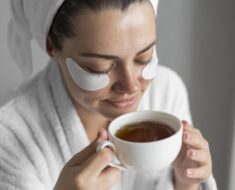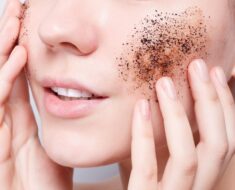Are you someone who loves their morning cup of coffee but worries about its effects on your skin?
In this article, we delve into the question: Is decaf coffee bad for your skin? Let’s uncover the truth behind this popular beverage and its impact on your skin health.
Decaf coffee, often seen as a healthier alternative, may not be as innocent as it seems.
While it lacks caffeine, it can still affect your skin due to other compounds present.
Understanding these nuances is crucial for making informed choices about your daily coffee consumption and its potential impact on your skin.
Here coffee bad for skin?
Curious to learn more about how decaf coffee can influence your skin’s health?
Join us as we explore the science behind its effects, debunk myths, and provide expert insights to help you make the best decisions for your skin and overall well-being.
Let’s dive into the fascinating world of decaf coffee and its relationship with skincare.
What is Decaf Coffee?
Decaf coffee, short for decaffeinated coffee, is a type of coffee that has had most of its caffeine content removed.
This process involves steaming green coffee beans, then rinsing them with a solvent like ethyl acetate or water to extract the caffeine. Another method uses activated carbon filters to trap caffeine molecules.

Decaf coffee typically retains much of the flavor and aroma of regular coffee but with significantly less caffeine, making it a popular choice for those sensitive to caffeine or looking to reduce their intake.
It offers a similar coffee experience without the stimulating effects of caffeine.
How is Decaf Coffee Made?
Decaf coffee is made using several methods, the most common being the solvent-based and water-based processes.
In the solvent-based method, green coffee beans are steamed to open their pores, then soaked in a solvent like ethyl acetate or methylene chloride to extract caffeine.
The beans are rinsed and dried, leaving behind decaffeinated coffee.
Here, Coffee ground good for skin?
The water-based method, known as the Swiss Water Process, uses water to extract caffeine, preserving flavor compounds through osmosis. Another method uses carbon filters to trap caffeine molecules.
These processes reduce caffeine content while retaining much of the flavor and aroma of regular coffee.
Is There Any 100% Decaf Coffee?
While there isn’t a method that can completely eliminate caffeine from coffee, there are decaf coffees that come close to being 100% caffeine-free.
The decaffeination processes can remove up to 97% of caffeine, leaving behind trace amounts that are typically negligible for most individuals.
For those extremely sensitive to caffeine, there are also specialty decaf coffees labeled as “ultra” or “super” decaf, which undergo additional purification steps to reduce caffeine content even further.
However, it’s essential to note that these coffees may still contain minimal traces of caffeine, but they are generally considered suitable for those seeking a caffeine-free option.
How Much Caffeine is in Decaf Coffee?
Decaf coffee contains a small amount of caffeine, typically ranging from 1 to 5 milligrams per 8-ounce cup.
The exact caffeine content can vary based on factors like the decaffeination method used, the type of coffee bean, and the brewing process.
For comparison, a regular cup of coffee contains around 70 to 140 milligrams of caffeine per 8 ounces.
Here, why is black coffee good for weight loss?
While decaf coffee is not completely caffeine-free, it is a significantly lower-caffeine alternative suitable for individuals who are sensitive to caffeine or trying to reduce their caffeine intake while still enjoying the flavor and aroma of coffee.
Is decaf coffee bad for your skin?
Decaf coffee is not inherently bad for your skin. In fact, it may offer some benefits due to its lower caffeine content.
Excessive caffeine intake can potentially lead to dehydration, which may indirectly affect skin health.

However, decaf coffee, with its reduced caffeine levels, is less likely to contribute to dehydration.
Moreover, coffee, whether regular or decaf, contains antioxidants that can help protect the skin from free radical damage, potentially promoting skin health.
Nevertheless, individual reactions to coffee vary, and factors like added sugars or creams can influence skin health more than the decaf aspect alone.
Who should choose decaf over regular coffee?
Decaf coffee is a suitable choice for several groups of people:
- Sensitive Individuals: Those sensitive to caffeine can opt for decaf to avoid jitters, anxiety, or sleep disturbances caused by regular coffee.
- Health Concerns: Individuals with health conditions like high blood pressure, acid reflux, or anxiety disorders may benefit from reducing caffeine intake with decaf coffee.
- Pregnant Women: Pregnant individuals often limit caffeine consumption, making decaf a safer choice to enjoy coffee without exceeding recommended caffeine levels.
- Evening Consumption: For those who enjoy coffee in the evening but want to avoid sleep disruptions, decaf provides the flavor without the stimulating effects.
Does decaf coffee use poor quality beans?
Decaf coffee doesn’t necessarily use poor quality beans. In fact, many reputable coffee producers use high-quality Arabica beans for decaffeination.
The quality of decaf coffee depends more on the sourcing and roasting process than the beans themselves.
However, it’s true that some lower-grade decaf coffees may use Robusta beans due to their higher caffeine content, but this isn’t a rule for all decaf coffee.
Here, how does green coffee bean wor for weight loss?
Ultimately, consumers can find high-quality decaf options made from carefully selected beans that undergo the decaffeination process without compromising on flavor or aroma.
Decaf Coffee Benefits for Longevity
Decaf coffee offers potential benefits for longevity:
- Heart Health: Reduced caffeine intake may lower blood pressure and improve heart health, contributing to a longer life.
- Antioxidants: Decaf coffee contains antioxidants like chlorogenic acid, which can help combat oxidative stress and reduce the risk of chronic diseases.
- Improved Sleep: Less caffeine means better sleep quality, which is crucial for overall health and longevity.
- Reduced Anxiety: Lower caffeine levels in decaf coffee can help reduce anxiety and stress, promoting mental well-being and longevity.
Overall, incorporating decaf coffee into a balanced lifestyle can contribute positively to longevity.
Decaf coffee is higher in mycotoxins!
The claim that decaf coffee is higher in mycotoxins is not entirely accurate. Mycotoxins are compounds produced by fungi that can contaminate certain food products, including coffee beans.
However, the decaffeination process, whether using solvent-based or water-based methods, typically includes steps that help reduce mycotoxin levels.
Additionally, reputable coffee producers follow strict quality control measures to ensure that their decaf coffee meets safety standards and contains minimal mycotoxin levels.
Therefore, while mycotoxins can be a concern in coffee, it’s not accurate to say that decaf coffee is inherently higher in mycotoxins compared to regular coffee.
Decaf coffee is loaded with antioxidants and contains nutrients
Decaf coffee does indeed contain antioxidants and some nutrients:
- Antioxidants: Decaf coffee retains many of the antioxidants found in regular coffee, such as chlorogenic acid, which helps fight oxidative stress and inflammation.
- Nutrients: While decaf coffee isn’t as nutrient-dense as some foods, it still contains small amounts of nutrients like potassium, magnesium, and vitamins B3 and B5.
These compounds contribute to overall health by supporting cellular function, reducing the risk of chronic diseases, and promoting a healthy immune system, making decaf coffee a beneficial addition to a balanced diet.
Regular coffee has several advantages over decaf
Regular coffee offers several advantages over decaf:
Here, how much coconut oil in coffee for weight loss?
- Higher Caffeine Content: Regular coffee provides a stimulant effect that can boost energy levels and enhance alertness, making it ideal for those needing a morning pick-me-up.
- Full Flavor Profile: Regular coffee maintains its full flavor and aroma, offering a richer and more robust coffee experience compared to decaf.
- Performance Enhancement: Caffeine in regular coffee can improve physical performance, focus, and cognitive function, making it popular among athletes and individuals needing mental acuity.
- Potential Health Benefits: Some studies suggest that moderate coffee consumption may lower the risk of certain diseases like Parkinson’s, Alzheimer’s, and liver disease.
How to Incorporate Decaf Coffee into Your Daily Routine
Incorporating decaf coffee into your daily routine can be enjoyable and beneficial:

- Morning Ritual: Start your day with a comforting cup of decaf coffee to savor the flavor without the caffeine jolt.
- Afternoon Pick-Me-Up: Enjoy a midday break with a decaf coffee to relax and recharge without disrupting sleep patterns.
- Evening Delight: Wind down your day with a soothing cup of decaf coffee as a cozy evening treat.
- Social Gatherings: Share decaf coffee with friends and family during social gatherings for a flavorful and caffeine-free beverage option.
Experiment with different brewing methods and add-ons like milk or spices to customize your decaf coffee experience.
Related faq’s
Do the decaf chemicals cause acne?
There is limited evidence to suggest that the chemicals used in the decaffeination process directly cause acne.
The primary chemicals used, such as ethyl acetate or carbon dioxide, are considered safe for consumption and are typically removed during the processing.
Acne is more commonly influenced by factors like genetics, hormonal imbalances, diet, and skincare routines.
However, individuals with sensitive skin or existing acne conditions may want to monitor their reactions to different foods and beverages, including decaf coffee, to identify any potential triggers that could exacerbate acne symptoms.
How can I use decaf coffee to lose weight?
You can use decaf coffee as part of a weight loss strategy in several ways:
- Appetite Control: Drink decaf coffee before meals to help suppress appetite and reduce overall calorie intake.
- Calorie Reduction: Replace high-calorie beverages like sugary drinks with decaf coffee to cut down on calories while still enjoying a flavorful drink.
- Energy Boost: Opt for decaf coffee in the afternoon for a caffeine-free energy boost that can help you stay active and burn more calories.
- Healthy Additions: Enhance the nutritional value of decaf coffee by adding skim milk or almond milk and avoiding excess sugar or cream.
Does decaf coffee wake you up?
Decaf coffee does not provide the same level of wakefulness as regular coffee due to its significantly lower caffeine content.
While decaf coffee contains a small amount of caffeine (usually 1-5 milligrams per 8-ounce cup), this amount is not enough to produce the stimulating effects associated with caffeine consumption.
Therefore, if you’re looking for a beverage to wake you up and increase alertness, regular coffee or other caffeinated beverages would be more effective.
Decaf coffee is better suited for individuals who want to enjoy the taste of coffee without experiencing the stimulating effects of caffeine.
Conclusion:
In conclusion, decaf coffee is not inherently bad for your skin.
While excessive caffeine intake can potentially contribute to dehydration, decaf coffee’s reduced caffeine levels make it less likely to have a negative impact on skin health.
Factors like added sugars or creams may have a more significant effect on skin than decaf coffee itself.






